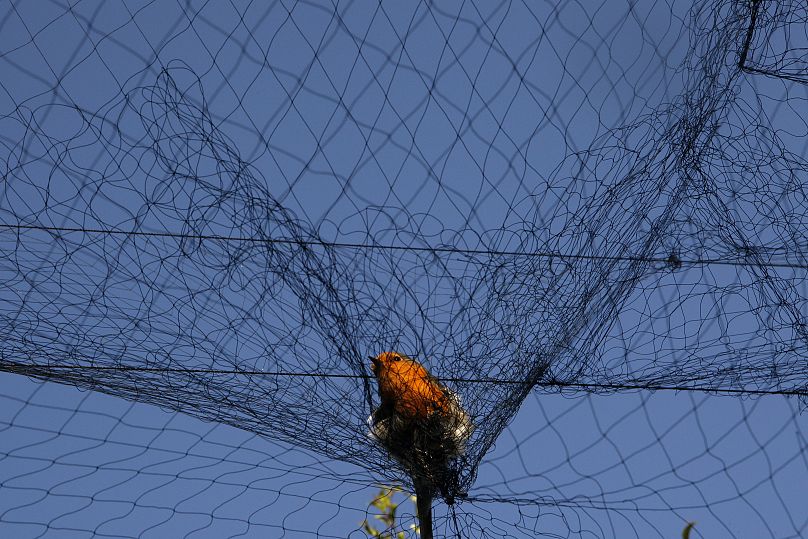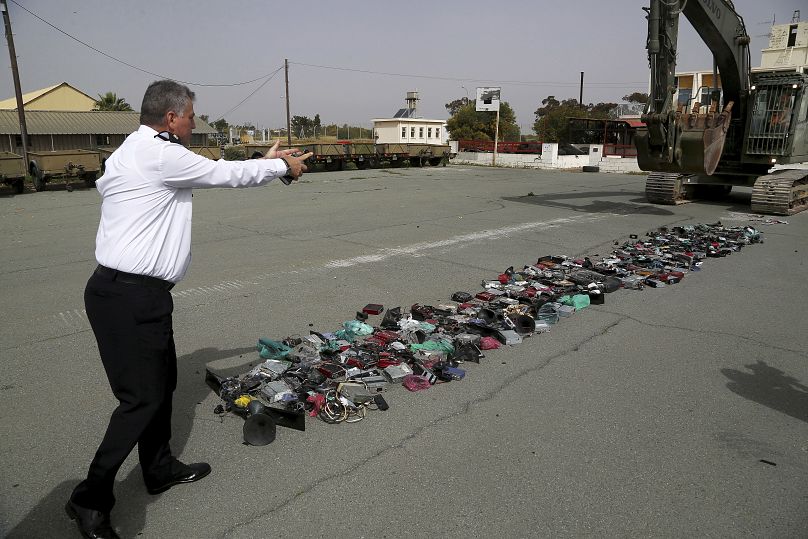Flocks of migrating birds are still meeting a cruel end on their flight path through the island, particularly at a British military base.
Cyprus has seen a “staggering” increase in songbird killing, according to a new report tracking organised wildlife crime.
435,000 birds, including blackcaps, warblers and robins, were caught in poachers’ nets last autumn, according to BirdLife Cyprus and RSPB researchers.
That’s a 90,000 increase from the 2022 season, reversing the downward trend in songbird killings over the last decade. BirdLife says that a drop in enforcement around the British Sovereign Base Areas on the island is partly to blame.
“We cannot allow the progress we have made to be undone and the shocking levels of songbird killings to return to the abhorrent levels we once saw,” says Mark Thomas, head of RSPB investigations.
Until recently, songbirds were killed in their millions in Cyprus due to a local penchant for eating them pickled or boiled as a dish called “ambelopoulia”.
This practice of trapping the little birds for human consumption was outlawed in 1974 but continued on an industrial scale - and persists today - via a hidden black market.
How and where are songbirds being killed in Cyprus?
Flocks of birds migrating from breeding grounds in Europe to wintering grounds in Africa are meeting a cruel end on their flight path through Cyprus.
Organised crime groups string up ‘mist nets’ covered in glue between bushes and orchards, or plant limesticks coated with adhesive material.
Poachers use decoys playing birdsong to lure the animals into these sticky snares, before returning to pluck them at dawn - often leaving their feet behind as they tear them away.
Blackcaps and the common European warbler are the main species in demand at Cypriot tavernas, but they’ll serve up other birds like robins too. Bigger, inedible birds such as golden orioles and hawks are also indiscriminately caught in the nets.
Authorities uncovered more than 4.5 kilometres of netting used to trap birds in autumn 2023.
One of the main areas monitored for bird trapping is near Famagusta, which encompasses the Dhekelia Eastern Sovereign Base (ESBA) - one of two Sovereign Base Areas (SBAs) that the British military maintains on the island.
Much of the increase in netting came from this SBA, where there was a 41 per cent spike in discoveries of the lethal material.
What’s behind the rise in songbird killings on a British military base?
After the “remarkable progress” of recent years, BirdLife Cyprus’ campaigns coordinator Tassos Shialis says 2023’s high figure is a “grim reminder of how fast things can go sideways when law enforcement takes a step back.”
The lowering of fines for limestick trapping from €2,000 to €200 (in 2020) has essentially decriminalised their use, while big, organised trappers continue undeterred, they say.
In the SBAs, “the understaffing of the SBA Police Anti-Poaching Unit has led to an increase in mist net trapping.”
The British military tends to keep a low profile at its Dhekelia and Akrotiri bases, which are valuable assets for surveillance on the edge of the Middle East.
But as songbirds took to the skies over Cyprus, the escalation of violence in Israel and Gaza in October - just across the Mediterranean Sea - has seen the SBAs take up a more active role. RAF Akrotiri was condemned by Cypriot campaigners for launching strikes on Houthi rebels in Yemen in January.
BirdLife Cyprus does not speculate on how the SBA’s surveillance needs have changed, or how that could have shifted police priorities to other resources. The NGO believes the reason the SBA Anti-poaching Unit has shrunk is due to the low trapping levels recorded in the previous years, thereby in the eyes of the SBA Police reducing the need for a larger unit.
“We need to maintain anti-trapping momentum, and authorities need to remain committed to a zero tolerance approach to bird trapping,” Shialis says.
“In the Republic of Cyprus, we need to see a renewed commitment from the Government to tackling the organised trappers who continue making huge profits for little risk,” adds the RSPB’s Mark Thomas. “By working together we can make this a thing of the past.”
Cyprus Police and the UK’s Ministry of Defence have been contacted for comment.













